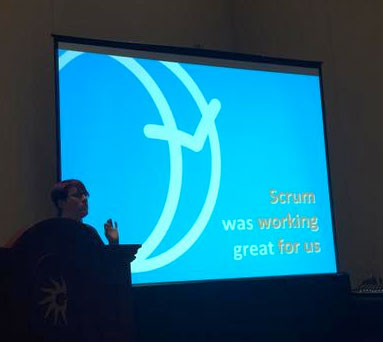In my current talk “Thank God it’s Open Friday” I describe our experiences at sipgate with holding an Open Space every other week.
If you’ve missed it, you can watch a recording (55 minutes) or read the paper. There are also slides, but they are not self-explanatory.
So far, I’ve given it at Agile and FrOSCon. Both times I’ve gotten great questions! In this post I’d like to collect questions and answers:
- How would you do Open Friday it with a distributed team?
Probably less often 😉
Is there a time when people meet anyway? Then, then.
Do only a few people work remotely? One attendee said that remote people attend via a laptop, which their “local” colleagues carry around. - What do you do if you’re few people (in this case: 6)?
Depends on what problem you want to solve with OF. If it’s knowledge transfer, try brown bag lunches. Invite outside people. Maybe pair up with another small company, if you don’t do supersecret stuff. - How do you ensure people pitch sessions?
In BarCamps you have to pitch a session, if you’re attending a BarCamp for the first time. Not the route I’d go, though. I’d try to ask people individually, to pitch a session and help with finding topics. I’d make sure there’s at least 2 people ready to be the first pitchers so that other feel comfortable following. - How often should you run an Open Space to try to establish it?
Not just once. At least 2 or 3 times. Before the 1st one I’d hang up these 1-pagers explaining Open Space, so that people know what to expect. - How long did it take for people from all departments to take part?
People from product teams joined first. They were used to self-organizing as well as the slack day. The others joined bit by bit and it took at least 2 months (= 8 OFs) and several encouragements that, yes, “everybody” did mean “everybody”. Now the OF opening ceremony has 50 (summer holidays) – 80 participants (out of 120 employees).
- What did C-level contribute?
Well, giving us time, obviously. And trust. They take part in the OFs by the way. - How important are the errors you made on your way towards OF for OF to work? Or would it work in every setting?
I believe OF can be beneficial in a lot of situations, but of course there will also be some in which it would tank due to lack of interest and / or courage to pitch.
The errors are not necessary, but trust is. And an environment in which failure is okay, will lead to better acceptance of OF and freeer sharing of experiences. - Isn’t OF bad for productivity, if people look forward to it and their special project and don’t work properly during the week?
First off, I don’t believe in productivity, I believe in results. And results are much better with information shared thanks to OF. You don’t have to work so much or so hard, if you avoid 4 detours because you started down the right lane, because you talked to people early on.
Secondly, our usual work is not exactly misery. I like what I’m doing most of the time. I’m part of an awesome team, building an awesome product. Looking forward to OF doesn’t lessen m my contribution at other times. And I’ve never observed it in anyone else, either. - How much time do you take to prepare an OF session before the actual day (i.e. during the sprint)?
Depends very much on the type of session. Most sessions (>90%) are discussions or brainstormings that don’t require preparation beyond phrasing the question / topic.
Teaching sessions require more preparation. If someone returns from a conference, they try to do the session at the very next OF. The content will still be fresh in their minds and require less preparation.
If you need considerable ramp up, you probably want to have this as a story in your sprint. We do this, if the OF session in question is relevant enough to the organization as a whole. - What about actually implementing stuff? When do you do that?
Smaller things may get implemented on an OF. Usually the developer will pitch it as a “I’ll be doing this at my desk, come join me if you’d like”-pseudo-session.
Bigger things, e.g. the result of a discussion / brainstorming may need to be turned into stories or epics and enter “normal workflow”. For some topics we even form temporary teams.
Any other questions?

